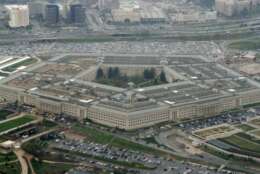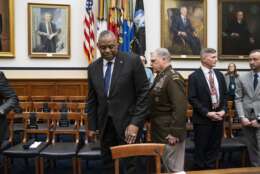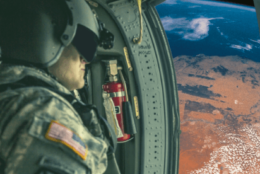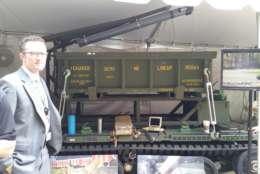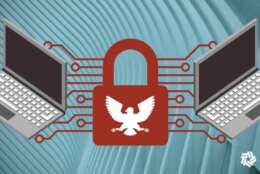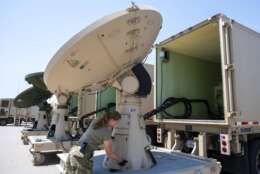Defense
-
Microsoft, Amazon Web Services, Google and Oracle won spots on DoD’s Joint Warfighting Cloud Capability (JWCC) vehicle.
December 07, 2022 -
DoD opens a new office that partners with venture capital to bring new technology into production.
December 07, 2022 -
In today's Federal Newscast: House and Senate Armed Services Committee leaders have reached an agreement on the National Defense Authorization Act. U.S. scientists turn into diplomats (of sorts) on foreign soil. And the Social Security Administration unveils its new website.
December 07, 2022 -
The COVID-19 vaccine mandate for members of the U.S. military would be rescinded under the annual defense bill heading for a vote this week in Congress. If the measure passes, it will end a policy that helped ensure the vast majority of troops were vaccinated but also raised concerns that it harmed recruitment and retention.
December 06, 2022 -
If SPACECOM wants to get ahead of traditional DoD timelines, it will need help from commercial partners.
December 02, 2022 -
Can robots teach themselves new tricks? In theory they can, according to researchers at the U.S. Naval Research Laboratory. In a new white paper, they lay out how robots, like people, can learn by using a curriculum and a learning agenda.
November 30, 2022 -
Deputy Defense Secretary Kathleen Hicks says DoD is building up a “first of its kind” prevention workforce that will address a range of "stress and harm behaviors," and will eventually reach an end strength of 2,000 personnel.
November 29, 2022 -
The Coast Guard is prioritizing data readiness as it begins updating its network infrastructure. One big challenge it faces is how to provide connectivity to its fleet in remote operating areas.
November 29, 2022 -
In today's Federal Newscast: The military’s Science and Technology Reinvention Laboratories can now pay you $226,000 per year. The National Science Foundation experiments with more working from home. And the cost of sending junk mail is going up.
November 29, 2022 -
Federal technology executives around government were moving into new jobs, retiring or heading to the private sector over the last few months.
November 29, 2022 -
James Sumpter from the Air Force Research Laboratory said that AFRL is focusing on supporting current networks, including legacy and isolated enclave ones.
November 23, 2022 -
They say an Army moves on its stomach. And, perhaps its vehicles on fossil fuel. But it would appear those vehicles are getting less dependent on gasoline and diesel, and more dependent on batteries. General Motors is developing battery pack prototypes for the Defense Innovation Unit, as a matter of fact.
November 22, 2022 -
The Pentagon's much-anticipated zero trust strategy lays out an ambitious, detailed plan for how DoD will adopt a "never trust always verify" approach.
November 22, 2022 -
In 2019, when Congress and the Trump administration enacted the U.S. Space Force, they left out something: A Space National Guard. After all, there are Army and Air Force civilian auxiliaries. There's even a Navy Militia. Last month, a Biden administration policy statement came out against a space national guard.
November 21, 2022 -
DoD and its contractors are still struggling to share timely, accurate information about cyber incidents peppering their networks.
November 21, 2022


